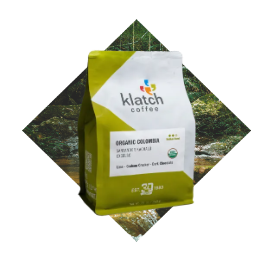
About this Coffee
Our Organic Colombia Santander Kachalú Excelso awakens with an aroma of citrus, with a medium sweetness. Flavor notes of lime, graham cracker and a dark chocolate finish.
The Kachalú Grower Association is comprised of 120 coffee growers and their families who are dedicated to the production of organic coffee and are also certified by Rain Forest Alliance. Located in the northern department of Santander which is blessed with lush natural forest, abundant water resources and mineral rich soil. The average farm size is about 25 acres and each farm runs its own micro wet mill and drying facilities, assuring top quality control from cherry to parchment. Colombian coffees are very well balanced and are produced throughout the year making them a good choice as a stand-alone varietal to a base component in the majority of blends and roast profiles.
History of Colombian Coffee
As with many coffee origins, it is believed that coffee was first brought to Colombia by priests, arriving, perhaps, within a decade or two after coffee first came to the Americas via the Caribbean in the first half of the 17th century. It was likely a garden crop grown for local consumption and barter for decades. Generations of Colombians tell the story of a priest named Francisco Romero, who could be called the father of commercial coffee cultivation in Colombia. The folkloric tale goes that in the early 1800’s, Father Francisco, hearing confessions in the north eastern town of Salazar de la Palmas, assigned planting coffee to his parishioners as penance for their sins. The Archbishop of Colombia heard about this and ordered all priests to adopt the practice. Commercial production of coffee expanded quickly, moving into regions where the growing conditions were ideal.
Growing Coffee in Colombia
Even though it’s been 4,000 years, the soil resulting from the last major eruption of Tolima is still considered “young soil,” filled with nutrients that are no longer found at the same levels in old soil.
Volcanic soil contains high levels of potassium and nitrogen, which are fading or absent in other soils. “Boron”, which arrived from outer space long ago, is also present. Boron plays a key role in a diverse range of plant functions: it is essential to the structure of plant cell walls and in the creation of enzymes, and in flowering and fruit formation, meaning that Boron contributes to coffee seed yield.
In addition to nutrients, the structure of volcanic soil is also beneficial to coffee growing. It can soak up and hold moisture while, at the same time, facilitating good drainage so that the water doesn’t pool, which is not good for coffee plant roots. Coffee plants like to take a drink, then take a break. Additionally, volcanic soils are usually found on an incline, which also helps with drainage. All of these “microclimate” factors come together to bring you the complex, nuanced flavors in your cup of coffee.